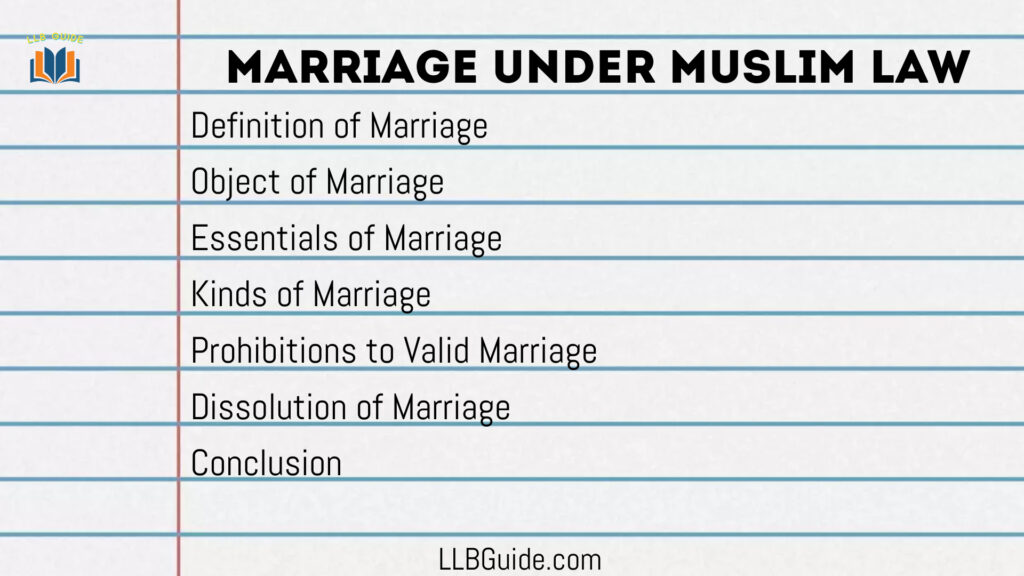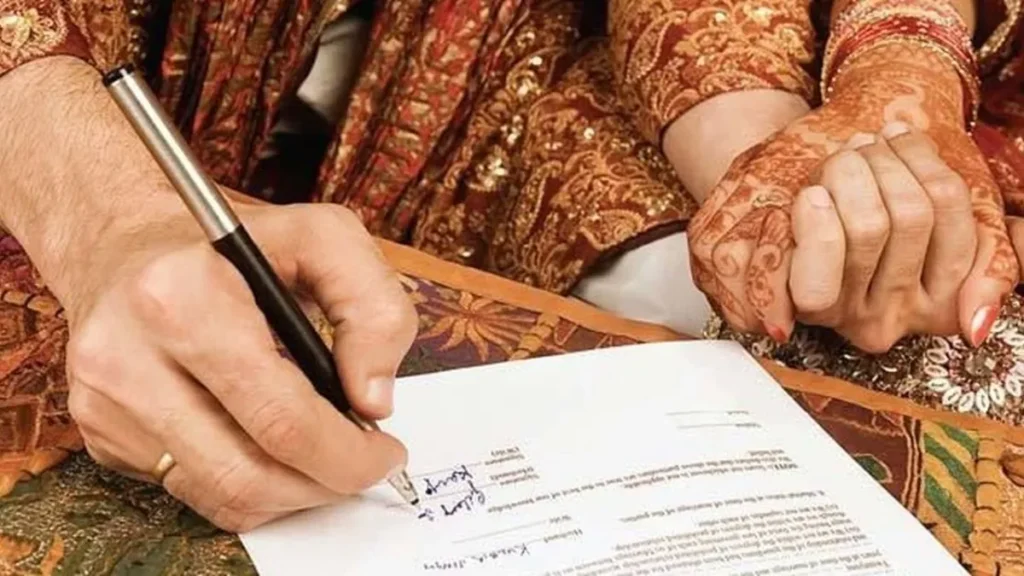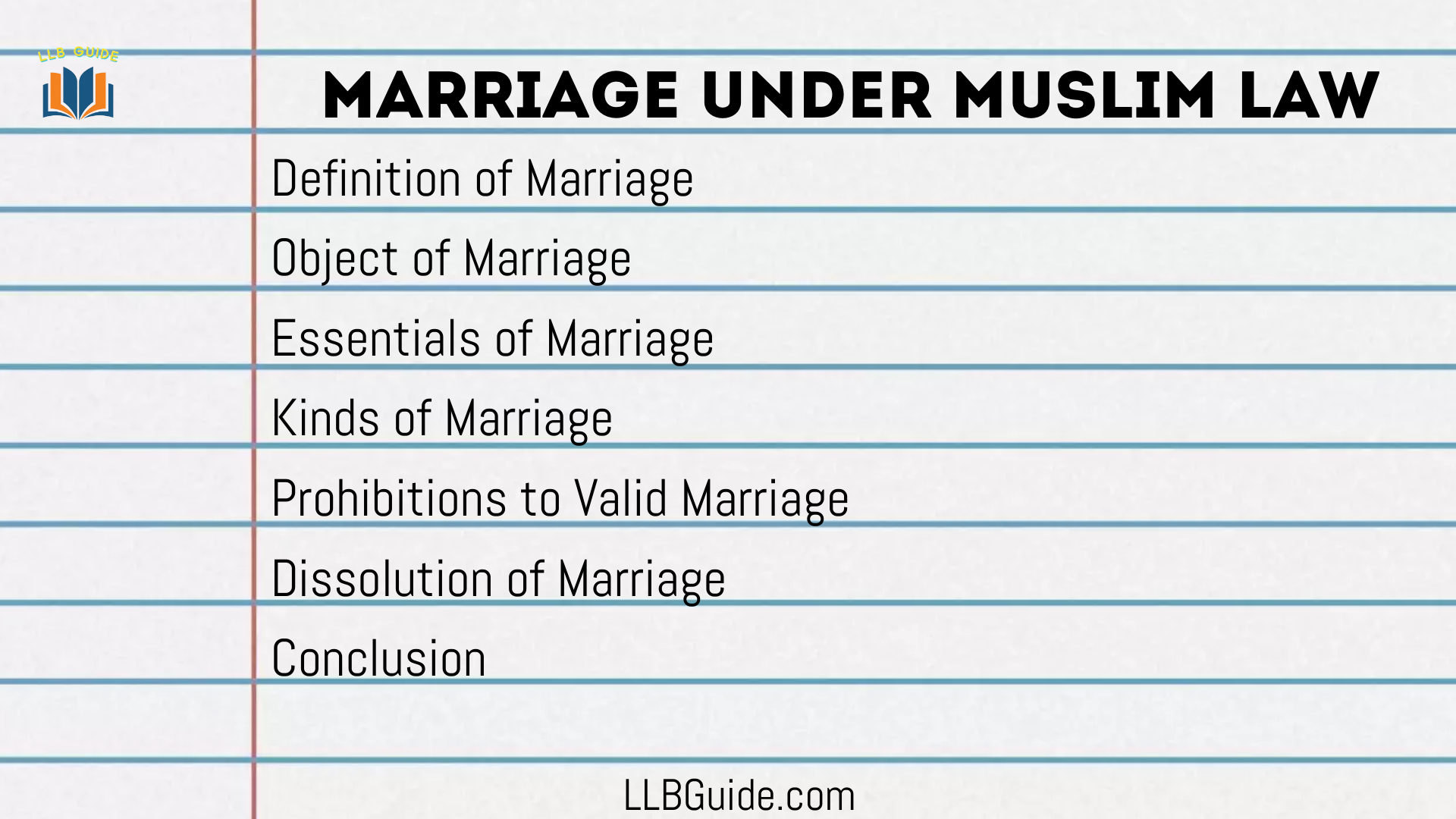Marriage under Muslim Law is known as Nikah. It is a civil contract that provides many personal benefits to both parties e.g. regulation of social life, regulates the rights and duties of husband and wife, declares their children legitimate, and ensures the preservation of the human race. The whole concept of marriage and the different forms of marriage are explained below.

Table of Contents
Nikah or Marriage Under Muslim Law
Our Beloved Prophet Hazrat MUHAMMAD (S.A.W) said: ‘If a person is in a position to maintain his wife and pay the amount of dower, he must get himself married’.
Nikah or Marriage under Muslim Law is Sunnat-ul-Muwa-Akidah, it is considered an act of Ibadat. It is a civil contract, it is a union of man and woman. According to Shariat, it is a way to legalize sexual intercourse and children of this union. Different schools of thought considered it:
- In HANAFI it is Highly recommended
- In SHAFI it is Permissibly
- In ZAHIRI it is Obligatory
Definition of Marriage
Marriage is an institution ordained for the protection of society, and in order that human beings may guard themselves from foulness and unchastity.
Marriage of Nikah is a civil contract, which is made by parties for the sole purpose and object of benefiting themselves.
According to Muhammadan Law: Marriage is a civil contract for the legalization of sexual intercourse and protection of children.

Object of Marriage
The Object of Nikah or Marriage under Muslim law is mentioned below:
- To legalize the cohabitation of a man and a woman
- To declare their children legitimate
- To sustain the Human race
- To regulate domestic life
- To provide safeguard from unchastity
Essentials of Marriage
The essentials of Nikah or Marriage under Muslim Law have been briefly explained below:
1. Offer and Acceptance
There must be an offer by one party to another party and such offer must be accepted by such other party. The words used for the acceptance of Nikah are “Qabool Hai”.
2. Two Parties
There must be two parties a ‘man’ and a ‘woman’ in order to get married.
3. Capacity of Parties
Both parties must not fall under prohibitions which are mentioned later in this article. The parties must be:
- Muslim
- Major
- Sound mind
4. Free consent
Free consent of both parties is necessary and it should not be obtained under coercion or fraud. Fraud marriage is void.
5. Same Meeting
The setting and meeting for Nikah or marriage under Muslim Law should be the same. An offer or proposal of Nikah made at one meeting and accepted at the second meeting makes it void.
6. Witnesses
Two witnesses from both sides should be present at the time of Nikah.
7. Dower
Kinds of Marriage
Dower is also considered as a consideration of marriage. It is a mandatory obligation, it includes an amount or property which can be given at the time of marriage, on demand, during marriage or at the time of dissolution of marriage.
Kinds of marriage under Muslim Law are of Following :
- Valid marriage: It covers all the essentials of marriage.
- Void marriage: It misses one or more essentials of marriage.
- Irregular marriage: It has an impediment, it can be converted to Valid by removing irregularities.
Prohibitions to Valid marriage
The following are the restrictions or prohibitions for a valid marriage:
1. Absolute Prohibition
A marriage against absolute prohibition is void, and the children will be illegitimate. It refers to marriage with blood relations or prohibited degree of relations, which are described below:
i. Consanguinity
It includes blood relations like:
- Mother or Grandmother
- Daughter or Grand-daughter
- Sister (irrespective of full blood/ half-blood/ uterine blood)
- An aunt or great aunt, whether paternal or maternal
ii. Affinity
It includes close relations like:
- Wife’s mother or Grand-mother
- Wife’s daughter or Grand-daughter
- Father’s wife or paternal Grandfather’s wife
- Son’s wife or son’s son’s wife or daughter’s son’s wife
iii. Fosterage
It includes foster relationships, under the age of two years if a woman breastfed the kid, the woman turns into the foster mother of the kid and he cannot marry:
- Foster mother or foster grandmother
- Foster sister
2. Relative Prohibition
Marriage against relative prohibition is irregular marriage and can be easily converted into a valid marriage. Relative prohibitions include:
i. Marriage during Iddat
Iddat is referred to as a time period, after the dissolution of marriage, to clear doubts about pregnancy. Marriage during Iddat is considered irregular according to Sunni Law, but in Shia law it is void.
ii. Difference of religion
Marriage under Muslim Law is prohibited with a person having any religion other than Islam. If such a person converts to Islam marriage will also become valid.
iii. Polygamy
The term polygamy under Muslim law means having more than four wives because Islam allows a maximum of four wives at the same time. In the case of polygamy, the fifth marriage will be irregular but it can be converted to a valid marriage by giving divorce to one of them. Shia law considers it Void.
3. Formal Prohibition
It includes other prohibitions like marriage with the wife of another person etc.
Dissolution of Marriage
Muslim marriage can be dissolved in the following ways:
- Divorce: It is given by a man to a woman
- Khulah: It is the dissolution of marriage by mutual consent.
Conclusion
In conclusion of marriage, Nikah, or marriage under Muslim law marriage is a highly recommended civil contract, it provides protection from unchastity and legalizes cohabitation of man and woman, it also declares the legal status of their children as legitimate, and it can be dissolved by Khulah or divorce.
FAQs
What is marriage under Islamic law?
Nikah or Marriage under Muslim Law is Sunnat-ul-Muwa-Akidah, it is considered an act of Ibadat. It is a civil contract, it is a union of man and woman.
Who is not allowed to marry in Islam?
Mother, grandmother, daughter, grand daughter, sister, niece, great-niece, aunts, or great-aunts or not allowed to be married with.
What are the conditions for marriage in Islam?
Conditions or essentials include:
a. offer and acceptance
b. two parties
c. capacity of the party (Muslim, major, sound mind)
d. free consent
e. same sitting and meeting
f.2 witnesses from both sides
g. dower

